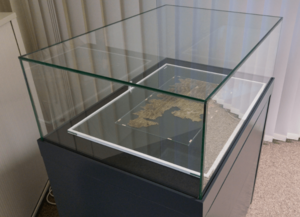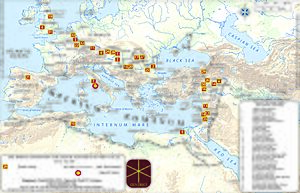Constitutio Antoniniana facts for kids
The Constitutio Antoniniana (Latin for "Constitution [or Edict] of Antoninus"), also called the Edict of Caracalla or the Antonine Constitution, was an edict issued in AD 212 by the Roman emperor Caracalla. It declared that all free men in the Roman Empire were to be given full Roman citizenship (and by extension all free women in the Empire were to be given the same rights as Roman women, such as the jus trium liberorum).
In the century before Caracalla, Roman citizenship had already lost much of its exclusiveness and become more available between the inhabitants throughout the different provinces of the Roman Empire and between nobles such as kings of client countries. Before the Edict, however; a significant number of provincials still were non-Roman citizens and held instead the Latin rights. Therefore, being a Roman citizen remained a well sought-after status till 212. Veterans of the Auxilia were also granted Roman citizenship on discharge.
As a result, vast numbers of new citizens assumed the nomen Aurelius, in honour of their patron (whose full name was Marcus Aurelius Antoninus), including several emperors: seven of the eleven emperors between Gallienus and Diocletian (Claudius Gothicus, Quintillus, Probus, Carus, Carinus, Numerian and Maximian) bore the name Marcus Aurelius.
Dediticii
- Further information: Dediticii#Dediticii and the Constitutio Antoniniana
The one exclusion to the universal grant occurs in a vexed passage referring to dediticii, a class of technically free people who lacked either full Roman citizenship or Latin rights. In the Imperial era, there were two categories of dediticii: the peregrini dediticii ("foreigners under treaty") who had surrendered and former slaves who were designated libertini qui dediticiorum numero sunt, freedmen who were counted among the dediticii because of a penal status that denied them the citizenship usually bestowed with manumission. The exclusion is most often taken to refer to the former slaves who had been treated as criminals by their master but for whatever reason were freed from ownership.
See also
- Constitution (Roman law)
- Peregrinus (Roman)



